Course description
Deep Learning Essentials
The Deep Learning Essentials course is your gateway to mastering one of the most exciting and transformative fields in Artificial Intelligence. This intermediate-level program is designed to equip learners with a thorough understanding of deep learning principles and their practical applications. Through a blend of theoretical insights and hands-on projects, you’ll gain the skills to build and optimize powerful models for real-world challenges.
What is Deep Learning?
Deep learning is a subset of machine learning that uses artificial neural networks to simulate the way humans learn and process information. It’s the driving force behind cutting-edge technologies like image recognition, natural language processing, and autonomous systems. In this course, you’ll explore how neural networks function, from their basic architecture to advanced optimization techniques.
What You Will Learn
• Foundational Concepts: Understand the building blocks of neural networks, including neurons, layers, weights, and activation functions.
• Training Models: Learn how models are trained using backpropagation, gradient descent, and optimization algorithms like Adam.
• Key Architectures:
• Convolutional Neural Networks (CNNs) for tasks like image classification and object detection.
• Recurrent Neural Networks (RNNs) and Transformers for handling sequential data in applications like text generation and translation.
• Real-World Applications: Dive into practical use cases in fields like healthcare, finance, and robotics.
• Model Optimization: Explore techniques to improve model performance, including hyperparameter tuning, regularization, and transfer learning.
• Deployment: Learn how to deploy trained models for real-world use cases.
Why This Course is Unique
• Hands-On Experience: Engage in practical projects using real-world datasets like CIFAR-10, MNIST, and IMDB Movie Reviews.
• Industry-Standard Tools: Gain proficiency in TensorFlow and PyTorch, the most widely used frameworks in deep learning.
• Comprehensive Curriculum: Move from beginner-friendly neural networks to advanced concepts like Transformers and Transfer Learning.
• Career-Focused: Designed to prepare you for roles in AI, machine learning engineering, and data science.
Course Breakdown
Module 1: Introduction to Deep Learning
• Understand the scope of deep learning and how it differs from traditional machine learning.
• Explore the history and evolution of neural networks.
Module 2: Neural Network Basics
• Learn the anatomy of a neural network: input layers, hidden layers, and output layers.
• Study activation functions like ReLU, sigmoid, and softmax.
• Build your first neural network using TensorFlow.
Module 3: Training Neural Networks
• Understand the mathematics of backpropagation and gradient descent.
• Learn how to measure and minimize errors using loss functions.
• Train a model on simple datasets and evaluate its performance.
Module 4: Computer Vision with CNNs
• Explore convolutional layers, pooling, and feature maps.
• Build a CNN for image classification.
• Use advanced techniques like data augmentation to improve model performance.
Module 5: NLP with RNNs and Transformers
• Understand how RNNs process sequential data like text.
• Dive into Transformers (e.g., BERT, GPT) for state-of-the-art natural language processing.
• Fine-tune a pre-trained model for sentiment analysis.
Module 6: Model Optimization and Deployment
• Discover techniques like dropout, early stopping, and hyperparameter tuning.
• Use pre-trained models for faster training (transfer learning).
• Learn to deploy models in production environments.
Key Projects
1. Image Classification: Build a convolutional neural network to classify handwritten digits from the MNIST dataset.
2. Sentiment Analysis: Train and fine-tune a Transformer model to analyze customer reviews for sentiment classification.
3. Custom Capstone Project: Choose between creating a CNN for image recognition or an NLP model for text classification.
Learning Outcomes
By the end of this course, you’ll be able to:
1. Build, train, and evaluate deep learning models for a variety of tasks.
2. Implement advanced architectures like CNNs and Transformers.
3. Optimize model performance using regularization and hyperparameter tuning.
4. Leverage pre-trained models and deploy them for real-world applications.
5. Confidently use TensorFlow and PyTorch to develop deep learning projects.
Who Should Take This Course?
This course is ideal for:
• AI enthusiasts with a foundational understanding of machine learning.
• Developers and engineers looking to expand their skillset into deep learning.
• Professionals in industries like healthcare, finance, and technology aiming to apply AI solutions in their fields.
Prerequisites
• Basic programming knowledge in Python.
• Familiarity with machine learning concepts like supervised learning, datasets, and evaluation metrics.
Tools and Resources
• Frameworks: TensorFlow, PyTorch.
• Datasets: MNIST, CIFAR-10, IMDB Reviews.
• Supplementary Materials: Cheat sheets, guides, and practice datasets.
Join Now to master deep learning and advance your career in the dynamic field of Artificial Intelligence!








